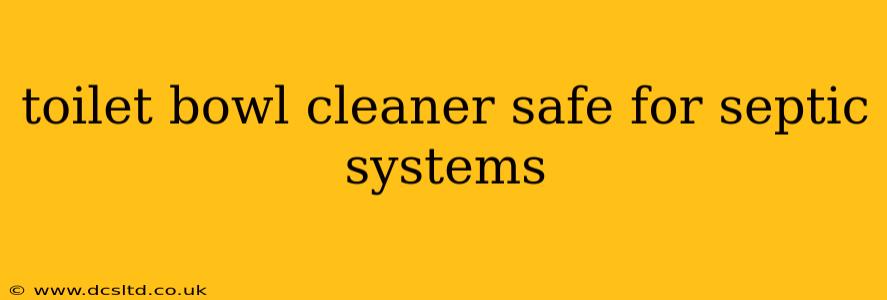Maintaining a clean and hygienic bathroom is crucial, but choosing the right toilet bowl cleaner is vital, especially if you have a septic system. Harsh chemicals found in many commercial cleaners can disrupt the delicate bacterial balance in your septic tank, leading to costly repairs and environmental damage. This comprehensive guide explores septic-safe toilet bowl cleaners and provides tips for maintaining a clean toilet without harming your septic system.
What Makes a Toilet Bowl Cleaner Septic-Safe?
The key to finding a septic-safe toilet bowl cleaner lies in understanding its ingredients. Avoid cleaners containing:
- Chlorine bleach: This powerful disinfectant kills beneficial bacteria crucial for the breakdown of waste in your septic tank.
- Strong acids: These can corrode septic tank components and damage the bacterial ecosystem.
- Formaldehyde: A common disinfectant, formaldehyde is harmful to the environment and septic system bacteria.
- Harsh chemical fragrances: While not directly harming the bacteria, these can sometimes contribute to imbalances.
Septic-safe cleaners generally rely on gentler, biodegradable ingredients like enzymes or non-toxic acids to clean and disinfect your toilet bowl. Always check the label carefully to ensure the product is explicitly labeled as "septic safe."
Are There Specific Types of Toilet Bowl Cleaners for Septic Systems?
Yes, there are several types of toilet bowl cleaners designed for septic systems. Many homeowners successfully use:
- Enzyme-based cleaners: These cleaners utilize natural enzymes to break down waste and stains, making them ideal for septic systems. They are gentler on the environment and the bacteria within your septic tank.
- Baking soda and vinegar: This classic cleaning duo is a natural and effective solution for many cleaning tasks, including toilet bowl cleaning. Baking soda acts as an abrasive cleaner, while vinegar's acidity helps to dissolve stains. This method is extremely septic-safe.
- Borax: A naturally occurring mineral, Borax can be used as a toilet bowl cleaner and is generally considered septic-safe in moderation. It's a good deodorizer and helps to eliminate stains.
How Often Should I Clean My Toilet Bowl with a Septic-Safe Cleaner?
The frequency of cleaning depends on your household size and usage. A weekly cleaning is generally sufficient for most households. However, if you notice stains or lingering odors, you may need to clean more frequently. Remember, consistent, gentle cleaning is more beneficial to your septic system than infrequent, harsh cleaning.
What Happens if I Accidentally Use a Non-Septic Safe Cleaner?
Using a harsh, non-septic safe cleaner can have detrimental effects on your septic system. This can include:
- Killing beneficial bacteria: Leading to slower waste breakdown and potential backups.
- Damaging the tank: Aggressive chemicals can corrode the tank's lining or other internal components.
- Causing unpleasant odors: Disrupted bacterial balance can lead to foul-smelling sewage gases.
- Increased maintenance costs: Septic system problems resulting from chemical damage can be expensive to repair or replace.
If you accidentally use a harsh cleaner, flush the toilet several times with plenty of water to help dilute the chemicals. Consider adding a septic treatment product to help restore the bacterial balance.
Can I Use Bleach in My Toilet Occasionally?
While many sources recommend against using bleach, a very small amount of bleach occasionally might not cause irreparable damage. However, this is generally not recommended and using a septic-safe cleaner is vastly preferable. The risk of harming your septic system's bacteria outweighs any perceived cleaning benefit.
What are Some Natural Alternatives to Commercial Toilet Bowl Cleaners?
Several natural alternatives offer effective toilet bowl cleaning without harming your septic system:
- Baking soda and vinegar: As mentioned earlier, this is an effective and inexpensive option.
- Pumice stone: A natural abrasive that can effectively remove stubborn stains. Use cautiously to avoid scratching the porcelain.
In conclusion, choosing a septic-safe toilet bowl cleaner is crucial for maintaining a healthy septic system. By understanding the ingredients to avoid and opting for gentler, eco-friendly alternatives, you can keep your toilet sparkling clean while protecting the environment and extending the lifespan of your septic system. Remember to always check product labels for specific recommendations and consult a septic professional if you have any concerns.
